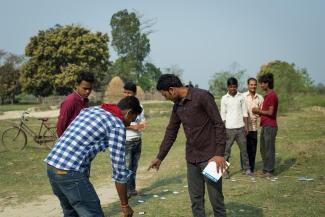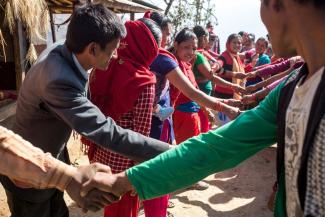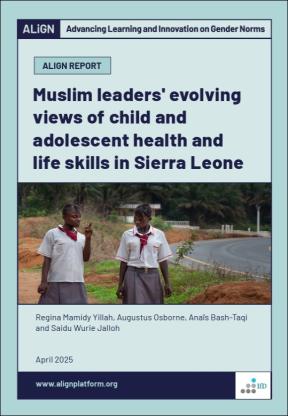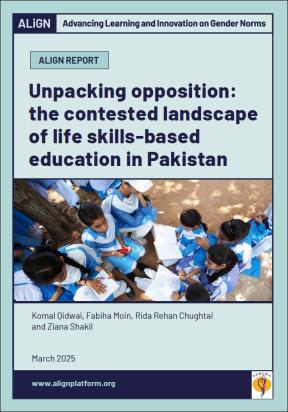- Case study
- 6 December 2018

“Our community is changing because of Pragati, and the games make it easy to pass on family planning messages to the community.” – Shyamkala, 24-year-old female from Pyuthan District, Nepal
In Nepal, a diverse country comprised of more than 100 ethnic groups, women’s reproductive health behaviours and outcomes are closely tied to strongly held social norms. Open discussion of fertility, reproductive health, and contraception is considered taboo, even among married couples, and sometimes limits discussion with health care providers. Restricting these conversations creates uncertainty among women and can prevent women from accessing accurate information about their own bodies and reproductive health.

In 2013, Save the Children and the Institute for Reproductive Health at Georgetown University (IRH/GU) began implementation of the five-year, USAID-funded Fertility Awareness for Community Transformation (FACT) project in Nepal. The goal of the FACT project was to test an intervention to improve fertility awareness and expand access to Fertility Awareness-based Methods (FAM) at the community level to improve family planning use and reduce unmet need. FACT was implemented across five districts in Nepal (Bajura, Nuwakot, Pyuthan, Rupandehi, and Siraha) and focused on reaching married and unmarried adolescents and marginalized ethnic groups, castes and religious communities (Janajati, Dalit, Muslim, and Chhetri).
PRAGATI – “Fertility Awareness for Quality of Life”
Through close partnership and collaboration with the Family Health Division, Ministry of Health and Population and District Public Health Offices, the FACT Project designed Pragati – a series of nine interactive games that diffuse information about fertility and family planning in group settings to community members, catalyzing conversations about reproductive health with others in the community. The games were developed through an iterative process of collecting formative research data with input from community stakeholders, to understand the ways in which community members share information and access services.
The nine Pragati games fall into three categories: Fertility Awareness, Family Planning methods and their Side-Effects, and Social Norms. In addition to increasing awareness about fertility and family planning methods, the games dispel myths and misconceptions about the side-effects of family planning methods and also facilitate discussion and critical reflection around the negative social and gender norms that influence family planning behaviors, such as son preference and menstrual hygiene taboos. Through the games, participants critically reflect on their own attitudes and the expectations of others that impact their reproductive health behaviors and decision making.
FACT trained and provided support to a wide network of community volunteers and partners to play the Pragati games in their communities:
- Female Community Health Volunteers delivered and promoted the games as part of their regular community-level health promotion activities, particularly with local mothers’ groups, called Health Mothers Groups (HMG), that FCHVs convene and meet with on a monthly basis
- Health Mothers’ Group Champions were nominated by other HMG members
- Male Champions engaged men through existing community groups and platforms
- Health Facility Providers promoted the community sessions and reinforced Pragati messages

Pragati Pilot Implementation Results
“In the past, [husbands] used to say that they wanted a son but now they are okay with either a son or a daughter… In the past, they used to marry another women if we couldn’t give birth to son… Now even if we have daughters they think it's their fate and go along with that.” – Married young woman, Pyuthan District
The Pragati intervention was tested and piloted for a 15-month period in the five project districts. During this period:
- Community promoters organized 9,315 game sessions, reaching 118,123 individual contact points
- 66% of the individual contacts were identified as marginalized community members
- 25% of contacts were men, suggesting that men were also interested in the games and their content

Health, Georgetown University
A mixed-methods, quasi-experimental study was conducted to assess the impact of the Pragati intervention on uptake and intention to use family planning. Household level surveys were conducted across the five districts before and after the study implementation with a sample of 2,430 women and 1,215 men between the ages of 15-25 years. Complementary qualitative data was collected through 81 focus group discussions and in-depth interviews to describe how game messaging was received and diffused through the community and to understand the factors influencing family planning use.
The endline evaluation findings showed that:
- All of the study participants reported enjoying the Pragati games and 97% suggested they would recommend the games to others
- In the intervention communities, women’s and men’s knowledge of general fertility and the fertile window increased significantly from baseline
- Men and women who played at least 4 Pragati games were 7.4 times more likely to have a high fertility awareness score
- Community norms related to family planning changed, creating a more supportive environment for utilization of FP methods. Compared to women in the comparison communities where Pragati was not implemented, women in the intervention communities at endline were:
- 2.1 times more likely to report positive attitudes toward family planning in their community
- 1.9 times more likely to view couples communication positively
- 1.4 times less likely to feel pressure to have a son
- 1.5 times less likely to feel pressure to have child immediate after marriage
- Family planning use increased in the intervention communities from 31% at baseline to 35% at endline, compared to control communities where it decreased from baseline to endline
- Women with high fertility awareness were 2.1 times more likely to be currently using a family planning method
- Women who perceived a high acceptability of family planning in their communities were 1.9 times more likely to report intention to use a family planning method in the next three months after the survey and 3.6 times more likely to use a family planning method in the next six months after the survey.

Health, Georgetown University
Overall, participants enjoyed playing the games and learning about topics that they had always been interested in but too afraid to discuss with others. They appreciated the new approach to learning as the games were engaging and accessible to everyone, including low-literate individuals. The simplicity of the games increased the effectiveness of community-level volunteers to implement and catalyze change and norms change in their communities. As the games were so well-received in the community, they spread beyond the initial platforms to schools, agricultural groups, loans and finance groups, and women’s empowerment groups, indicating that the content and format of Pragati can be integrated into and relevant for non-health programs.
- Countries / Regions:
- Nepal
Related resources
Report
14 April 2025

Report
26 March 2025

Report
13 November 2024
